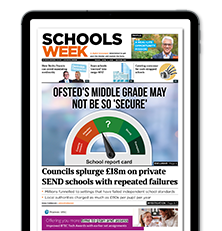The government has said it will “explore” legislative changes to include schools as a statutory safeguarding partner, following a consultation on updating its multi-agency child protection guidance.
It comes after it received criticism for its “half-hearted” response to Josh MacAlister’s landmark review of social care, which recommended schools should become legal safeguarding partners alongside police, health services and councils.
In its response in February, the government said it agreed education “needs to play a greater role in local safeguarding arrangements” and would consult on how to “strengthen” its role.
Government ‘testing out’ how schools could be safeguarding partner
The Department for Education (DfE) also said it would “use learning from this” to form proposals on “whether and how to” make education a safeguarding partner through consultation this autumn.
But the response to its consultation on its statutory safeguarding guidance, as part of wider reforms to children’s social care, sets out that it is “exploring” possible legislative changes to make the move.
It is “testing out” how a “strengthened role” for education would look in practice through its Families First for Children Pathfinder programme.
The updated Working Together to Safeguard Children guidance, also published this morning, also underlines the role of schools, after the government said it would ensure education settings were “appropriately referenced” in its response to the consultation.
School absences could be an indicator of abuse
The guidance states practitioners – which refers to anyone who works with children and their families – should be “proactive” in sharing information as “early as possible” to help identify, assess and respond to concerns about the safety of children.
It notes that this may be when problems are first emerging “for example, persistent school absences“.
Where children are not receiving education, either because they are “persistently missing school” or are not registered at a school and not receiving a “suitable” education, this could be a “possible indicator of neglect, abuse or exploitation”.
Therefore, it is also “important that relevant information where children are home educated” is shared between councils, schools and other relevant partners.
Schools must notify the council of a child’s removal from the school roll “at a non-standard transition point” and information on the child’s circumstances.
Staff should ‘be aware’ of how experiences can impact attendance and progress
The government has also added additional wording on how children’s experiences can impact them to include attendance and progress.
“Those working in education and childcare settings need to be aware of how children’s experiences can impact on their mental health, behaviour, attendance and progress” at school, the guidance states.
Schools’ views should be heard at ‘highest level of decision-making’
The update underlines how multi-agency partners should work with schools, including lead safeguarding partners (LSPs), which head up each partner agency.
As school staff may be the “first trusted adult to whom children report safeguarding concerns”, LSPs should give “careful consideration” to naming all local schools as “relevant agencies”.
They should also “create an environment” enabling all schools in the area to be “fully engaged, involved and included” in local safeguarding arrangements.
“This means making sure that the views and contributions of education … providers are articulated at the highest level of decision-making”, the guidance says.
It adds that LSPs should have an education representative at strategic discussions.
Schools are also now listed among the representatives that do not have a statutory duty to cooperate under multi-agency public protection arrangements (MAPPA) but may be included in “on a case-by-case basis”.
















Schools should absolutely be made a statutory agency – particularly when the other agencies will decide, without consultation, that a safeguarding matter will remain with school rather than police or social care. Decisions quite often made without speaking to school or fully discussing a case or supporting rationale. It’s time schools didn’t have to fight so hard to be heard and weren’t left to pick up the pieces of other failing services.
How long ago did Victoria Climbie die? And how many more years must pass before multi-agency working is properly secure so that the dozens of abused children who have died since Every Child Matters was first written become the last?
No matter how many times Working Together To Safeguard Children gets rewritten, children still die because statutory partners are overstretched, underesourced and too often fail to work together adequately.